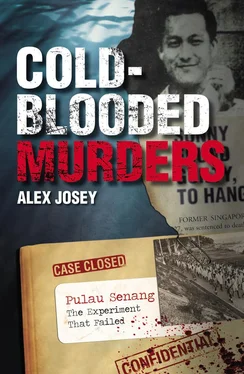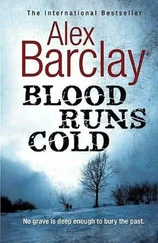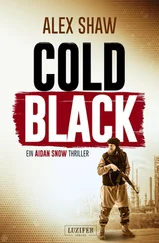Alex Josey - Cold blooded murders
Здесь есть возможность читать онлайн «Alex Josey - Cold blooded murders» весь текст электронной книги совершенно бесплатно (целиком полную версию без сокращений). В некоторых случаях можно слушать аудио, скачать через торрент в формате fb2 и присутствует краткое содержание. Жанр: Криминальный детектив, на английском языке. Описание произведения, (предисловие) а так же отзывы посетителей доступны на портале библиотеки ЛибКат.
- Название:Cold blooded murders
- Автор:
- Жанр:
- Год:неизвестен
- ISBN:нет данных
- Рейтинг книги:5 / 5. Голосов: 1
-
Избранное:Добавить в избранное
- Отзывы:
-
Ваша оценка:
- 100
- 1
- 2
- 3
- 4
- 5
Cold blooded murders: краткое содержание, описание и аннотация
Предлагаем к чтению аннотацию, описание, краткое содержание или предисловие (зависит от того, что написал сам автор книги «Cold blooded murders»). Если вы не нашли необходимую информацию о книге — напишите в комментариях, мы постараемся отыскать её.
Cold blooded murders — читать онлайн бесплатно полную книгу (весь текст) целиком
Ниже представлен текст книги, разбитый по страницам. Система сохранения места последней прочитанной страницы, позволяет с удобством читать онлайн бесплатно книгу «Cold blooded murders», без необходимости каждый раз заново искать на чём Вы остановились. Поставьте закладку, и сможете в любой момент перейти на страницу, на которой закончили чтение.
Интервал:
Закладка:
Destruction
On the morning of 12 July 1963, the tragic day of the Pulau Senang uprising, Major Peter L. James, a retired regular British army officer, then Director of Singapore Prisons, got to his office in (Upper Pickering Street about 12:30 PM. He had spent the morning on inspection in Changi Jail. He was told that Dutton wanted him urgently on the radio. Pulau Senang was linked to the main island by radio telephone. James rang Dutton at 12:40 PM. Dutton told him that ‘there is a rumour here that there is going to be trouble, that they are out to get me.’
James asked Dutton what action he had taken. Dutton said he had arrested the ring-leaders and was trying to contact the Marine Police. James told Dutton he would get in touch with the police in Singapore right away. Dutton protested that this was not necessary. As Dutton continued to argue, James broke the connection. Then he telephoned the police. James got through to the Assistant Commissioner of Police, Cheah Teng Check, and Cheah said he would send a troop from the reserve unit there without delay. James then telephoned Dutton to tell him to expect the police at about 2:00 PM. Button’s reaction was to grumble ‘there is no need for that’. At the trial of the ringleaders, James gave evidence that he told Dutton to carry out Standing Instructions. This meant that if there was trouble, Dutton and his staff should get off the island. Dutton replied: “Good God! There’s no need for that. There are always plenty of them who will stand by me.” James told Dutton that he would ring again at 2:00 PM.
On the island, the situation worsened rapidly. Dutton realised, too late, that he needed help, urgently. His frantic and belated call for help was received by the Marine Police at 1:12 PM. They recognised Dutton’s voice. Dutton kept saying: “Situation very bad. Please inform Coastguard.” The message was repeated three times. A police boat was instructed to proceed to Pulau Senang from Tanjong China. All marine officers at sea were informed. Lance-Corporal Abdul Aziz bin Saji was patrolling off Pulau Sebarok. He received a message at 1:14 PM. that there was rioting at Pulau Senang. He was ordered to proceed there immediately. He went in as close to the island as was possible with the low tide. Through binoculars he saw a lot of people on the beach. Five minutes later, he saw a prison boat heading towards Indonesian waters. The police boat set off in pursuit. He indicated for it to stop, but the boat continued on its course. The corporal fired two warning shots. He then fired at the engine, but missed. At 2:00 PM a Customs boat joined in the chase, overtook the police boat and rammed the escaping boat which sank. The seven occupants were picked up by the police boat. Just before the collision, Marlow, a mechanic, who had been kidnapped, jumped into the sea. He, too, was rescued. His real name was Chan Seng Onn. At Pulau Senang, where he was known as Marlow, he was in charge of outboard motors and their servicing. A group of gangsters had surrounded him and ordered him into the boat.
James knew nothing of this dramatic development. Just before 2:00 PM, he again rang Pulau Senang, but could make no contact. Almost at once the Master Attendant telephoned with the news that there was trouble on the island; fire was burning.
At once Major James made arrangements to get over to Pulau Senang. He arrived at about a 3:45 PM. The island was aflame as he approached. The police were already there and had rounded up the rioters. James was told that Button and two others were dead, and 75 per cent of the buildings were destroyed. Total damage was estimated, in financial terms, at about half a million dollars.
At the trial, the Public Prosecutor, Mr Francis Seow, said that Dutton had died a terrible death, ‘having blundered by under-estimating the size of the uprising’. Mr Seow reckoned that ‘quite a sizeable section’ of the 316 detainees on the island that day were involved in the rioting. He said that trouble had begun when 13 carpenters were sent back to Changi Jail on 9th July for refusing to work on the 400-foot jetty on a Saturday afternoon. Major James later told Dutton that he had been ill-advised to do this.
But even before Dutton had sent the carpenters back, some of the detainees were already plotting to kill him. Informers reported this to Dutton. On 10 July, some of the leaders of the riot drew up a death-list of six prison officers. This list was later amended to include known, or suspected, informers. Men were allocated their respective responsibilities in the uprising. Dutton heard about this the same day. He refused to treat the threat seriously. One of the detainees, the informers said, boasted that the riot would shake the whole of Malaysia (of which Singapore was then part). Dutton was given the latest intelligence reports and also informed about the plot to kill him. Dutton brushed them aside: he preferred to believe that the majority of the detainees would stand by him if there was trouble.
James did not share his optimism. To start with, the Director of Prisons doubted whether any long-time secret society gangster could ever be rehabilitated. He had also opposed the appointment of ex-Pulau Senang detainees as settlement attendants. In his opinion, to employ ex-prisoners in a position of authority in a prison system was wrong. It was quite possible that a detainee could find that he was being supervised by a settlement attendant who was, or had been, a member of a rival secret society. Dutton on the other hand sincerely believed that a man’s salvation came through hard work. He was anxious to retain the services of freed detainees on Pulau Senang who had showed peculiar talents for building, laying pipes, and so on. Dutton had argued that detainees set free would be grateful to be given a ‘government job’ on the island, and would never again turn to a secret society. James, a most experienced prison officer, disagreed. He later told the Court that he thought that ‘government circles’ agreed with him, but he added, ‘certain people’ in the end decided that ex-detainees could be employed as settlement attendants. He felt it to be a mistake.
At the time of the riot, there was a staff of 45 on the island. There were no firearms, no tear gas. There were wicker-shields and batons. In Court, at the trial, James gave his opinion that had Dutton been surrounded by regular prison staff, ‘we might have seen some of the rioters injured. I saw none.’ He added: “If you want my opinion I should say that the staff might well have given a better account of themselves.”
Major James told the Court that it was his decision that there should be no firearms on the island. “We were always out-numbered: if we had firearms there was always a real danger of these arms being taken from us, falling into the hands of the detainees.” The whole question had been discussed at great length with the police. There were no firearms in British prisons. It would have been psychologically wrong for prison staff to walk about Pulau Senang with firearms. “It was our intention to have firearms on the neighbouring island of Pulau Pawai where we were building an armoury. In the event of trouble the orders were to evacuate to this island. The armoury had not been completed by 12 July.” James was asked whether it wouldn’t have been a good idea to have smuggled a Sten-gun into Pulau Senang and hidden it somewhere where Dutton could have had ready access to it. James opposed the idea.
“Would a Sten-gun in that radio room at 1:00 PM on the 12th of July have saved the situation?” asked Mr C.H. Koh, one of the counsel for the defence.
Major James said, “That is debatable.”
Because of what James considered to be Dutton’s misplaced trust in the detainees, he decided to go over to Pulau Senang on 11 July (the day before the uprising) to tell Dutton to take seriously the reports of the plot to kill him, and to take precautions. That was when he told Dutton that he had been ill-advised to send the carpenters back to Changi. James told Dutton that he did not think the work on the jetty was urgent enough to insist upon work on Saturday afternoons. James told Dutton that he would probably send them back again to Pulau Senang within a reasonably short space of time.
Читать дальшеИнтервал:
Закладка:
Похожие книги на «Cold blooded murders»
Представляем Вашему вниманию похожие книги на «Cold blooded murders» списком для выбора. Мы отобрали схожую по названию и смыслу литературу в надежде предоставить читателям больше вариантов отыскать новые, интересные, ещё непрочитанные произведения.
Обсуждение, отзывы о книге «Cold blooded murders» и просто собственные мнения читателей. Оставьте ваши комментарии, напишите, что Вы думаете о произведении, его смысле или главных героях. Укажите что конкретно понравилось, а что нет, и почему Вы так считаете.












